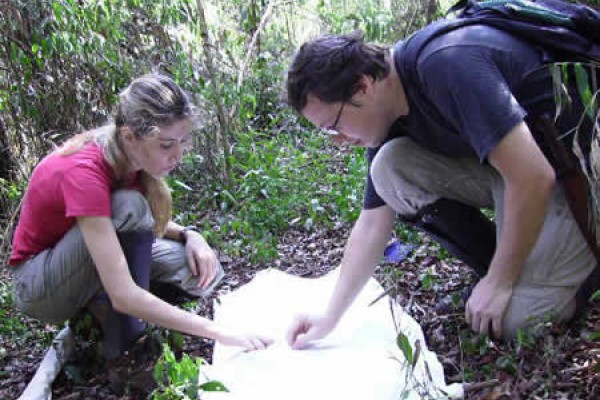 ::cck::154::/cck::
::cck::154::/cck::
::introtext::
Forest destruction converts continuous habitats into fragmented landscapes, often surrounded by cultivated areas, pasture and cities. These changes generate alterations in fauna and flora, as well as the transmission dynamics of infectious diseases. Pathogens previously maintained at endemic levels and at an environmental equilibrium become threats to human and animal life. They are responsible for emerging or re-emerging infectious disease.
::/introtext::
::fulltext::
Environmental fragmentation reduces the size of forest remnants, decreases connectivity to other fragments and increases the proportion of forest border to edge. One of the consequences of fragmentation is the reduction of species diversity. However, some generalist species with small ranges can increase to high densities in altered fragments because of the lack of predators and of competing species. Thus, ticks in these areas are often infected because they feed from a small and little-diversified population of vertebrates. This contributes to high rates of pathogens and increased risk of infection to mammal populations, including humans.
The Pontal do Paranapanema, in western São Paulo State, is a recent example of environmental alteration. The landscape, comprised by various forest fragments surrounded by anthropic activities, illustrates the epidemiological effect of fragmentation, as well as its relation to the emergence or re-emergence of infectious diseases.
::/fulltext::
::ac_acordeon::4::/ac_acordeon::
::cck_ac_acordeon::acordeon::/cck_ac_acordeon::
::ac_titulo_acordeon|0|ac_acordeon::Objectives::/ac_titulo_acordeon|0|ac_acordeon::
::ac_texto_acordeon|0|ac_acordeon::
The general objective of this study is the evaluation of tick diversity and the pathogens that infect these invertebrates in order to ascertain the risks of infection to wildlife, domestic animals and humans. We evaluate density and distribution of ticks and their hosts in the Pontal do Paranapanema.
::/ac_texto_acordeon|0|ac_acordeon::
::cckend_ac_acordeon::::/cckend_ac_acordeon::
::cck_ac_acordeon::acordeon::/cck_ac_acordeon::
::ac_titulo_acordeon|1|ac_acordeon::Development::/ac_titulo_acordeon|1|ac_acordeon::
::ac_texto_acordeon|1|ac_acordeon::
We hope to understand the transmission dynamics of pathogens and ectoparasites in order to propose preventative and control methods for environmental health.
::/ac_texto_acordeon|1|ac_acordeon::
::cckend_ac_acordeon::::/cckend_ac_acordeon::
::cck_ac_acordeon::acordeon::/cck_ac_acordeon::
::ac_titulo_acordeon|2|ac_acordeon::Team::/ac_titulo_acordeon|2|ac_acordeon::
::ac_texto_acordeon|2|ac_acordeon::
Cássio Roberto Leonel Peterka
Veterinarian, Master’s in Experimental and Applied Epidemiology of Zoonoses (FMVZ-USP)
[email protected]
Débora de Sousa Bandeira
Veterinarian
[email protected].
::/ac_texto_acordeon|2|ac_acordeon::
::cckend_ac_acordeon::::/cckend_ac_acordeon::
::cck_ac_acordeon::acordeon::/cck_ac_acordeon::
::ac_titulo_acordeon|3|ac_acordeon::Support::/ac_titulo_acordeon|3|ac_acordeon::
::ac_texto_acordeon|3|ac_acordeon::
- FAPESP
- Wildlife Trust
::/ac_texto_acordeon|3|ac_acordeon::
::cckend_ac_acordeon::::/cckend_ac_acordeon::
::ac_arquivos::1::/ac_arquivos::
::cck_ac_arquivos::arquivo::/cck_ac_arquivos::
::ac_titulo_arquivo|0|ac_arquivos::::/ac_titulo_arquivo|0|ac_arquivos::
::ac_arquivo|0|ac_arquivos::::/ac_arquivo|0|ac_arquivos::
::cckend_ac_arquivos::::/cckend_ac_arquivos::
::ac_galeria::3::/ac_galeria::
::cck_ac_galeria::galeria::/cck_ac_galeria::
::ac_foto_descricao|0|ac_galeria::::/ac_foto_descricao|0|ac_galeria::
::ac_foto|0|ac_galeria::images/artigo_completo/galeria/1271/119-8332fc40dd.jpg::/ac_foto|0|ac_galeria::
::cckend_ac_galeria::::/cckend_ac_galeria::
::cck_ac_galeria::galeria::/cck_ac_galeria::
::ac_foto_descricao|1|ac_galeria::::/ac_foto_descricao|1|ac_galeria::
::ac_foto|1|ac_galeria::images/artigo_completo/galeria/1271/220-f9538324ff.jpg::/ac_foto|1|ac_galeria::
::cckend_ac_galeria::::/cckend_ac_galeria::
::cck_ac_galeria::galeria::/cck_ac_galeria::
::ac_foto_descricao|2|ac_galeria::::/ac_foto_descricao|2|ac_galeria::
::ac_foto|2|ac_galeria::images/artigo_completo/galeria/1271/317-4567cc7edd.jpg::/ac_foto|2|ac_galeria::
::cckend_ac_galeria::::/cckend_ac_galeria::


